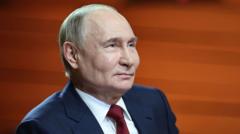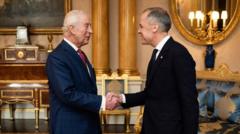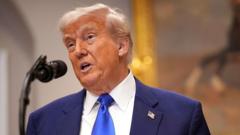Recent developments indicate that Vietnam's compliance with Trump's business ventures has significant implications both locally and on an international scale, particularly amid trade negotiations.
Why Vietnam Prioritized Trump's Golf Project Over Local Laws

Why Vietnam Prioritized Trump's Golf Project Over Local Laws
In a striking move, Vietnam has opted to bypass its own regulations to facilitate the establishment of a Trump golf complex, reflecting the shifting dynamics between politics and business.
When officials in the Hung Yen Province of Vietnam approached residents about signing letters in support of the Trump Organization's new golf community, many were hesitant. Le Van Truong, 54, contemplated the consequences of the project that threatened to displace generations of his ancestors buried in a local cemetery and to take over farmland cultivated over the years. Despite his reservations, he felt he had no choice but to comply: “There’s nothing I can do,” he lamented.
This ambitious $1.5 billion golf project, set to rise outside of Hanoi alongside plans for a Trump skyscraper in Ho Chi Minh City, marks a significant escalation in the Trump family's business endeavors abroad. Legal experts are concerned that Vietnam’s decision to overlook its own laws to fast-track this project is indicative of the power dynamics at play between the Trump administration and international relations. Officials have openly acknowledged that the project's swift progress is due in large part to its connection to President Trump, citing its reception of “special attention” from the highest levels of American governance.
As Vietnam navigates high-stakes diplomacy with the U.S., the threat of punitive tariffs looms large, with President Trump proposing tariffs as steep as 30% on Vietnamese exports. This pressure has seemingly encouraged Vietnamese officials to prioritize Trump's golf venture, raising questions about the integrity of national policies in favor of maintaining favorable ties with the U.S. As Vietnam accommodates foreign investment from a U.S. president's family, the implications for local communities, governance, and international relations remain profound.
This ambitious $1.5 billion golf project, set to rise outside of Hanoi alongside plans for a Trump skyscraper in Ho Chi Minh City, marks a significant escalation in the Trump family's business endeavors abroad. Legal experts are concerned that Vietnam’s decision to overlook its own laws to fast-track this project is indicative of the power dynamics at play between the Trump administration and international relations. Officials have openly acknowledged that the project's swift progress is due in large part to its connection to President Trump, citing its reception of “special attention” from the highest levels of American governance.
As Vietnam navigates high-stakes diplomacy with the U.S., the threat of punitive tariffs looms large, with President Trump proposing tariffs as steep as 30% on Vietnamese exports. This pressure has seemingly encouraged Vietnamese officials to prioritize Trump's golf venture, raising questions about the integrity of national policies in favor of maintaining favorable ties with the U.S. As Vietnam accommodates foreign investment from a U.S. president's family, the implications for local communities, governance, and international relations remain profound.



















